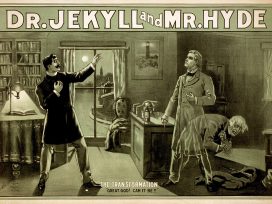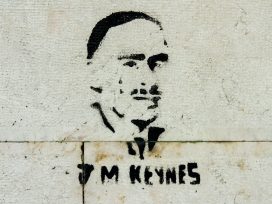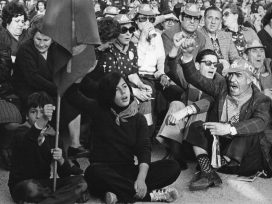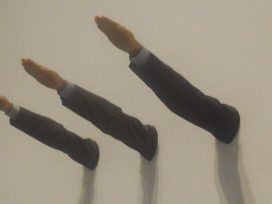Ieva Lesinska: Isaiah Berlin, as you say in your 1998 biography, felt no nostalgia for anywhere, including Riga. So is it not strange that Riga is now claiming him as one of its own? What imprint, if any, did Riga leave on Berlin?
 Michael Ignatieff: It’s true he wasn’t nostalgic about Riga, but he owes a lot to Riga. If he had been born in Moscow or Berdichev or somewhere else in the Russian Empire, he might not have got to England and might not have become the philosopher he became. The Russian revolution swallowed up a lot of people but it didn’t swallow up that family – and it didn’t swallow them up because they were from Riga. His father Mendel, as a merchant in Riga, had connections with the timber companies in London and was able to move fairly seamlessly into a new life in England. That Isaiah was born in a Hanseatic port is an extremely important fact about his biography. There was a substantial Jewish community here, well-established and not subject to overt persecution. All of that was extremely important in making him who he was. He wasn’t nostalgic about Riga, but I don’t think it’s an exaggeration to say that Riga was very much part of what made him who he was.
Michael Ignatieff: It’s true he wasn’t nostalgic about Riga, but he owes a lot to Riga. If he had been born in Moscow or Berdichev or somewhere else in the Russian Empire, he might not have got to England and might not have become the philosopher he became. The Russian revolution swallowed up a lot of people but it didn’t swallow up that family – and it didn’t swallow them up because they were from Riga. His father Mendel, as a merchant in Riga, had connections with the timber companies in London and was able to move fairly seamlessly into a new life in England. That Isaiah was born in a Hanseatic port is an extremely important fact about his biography. There was a substantial Jewish community here, well-established and not subject to overt persecution. All of that was extremely important in making him who he was. He wasn’t nostalgic about Riga, but I don’t think it’s an exaggeration to say that Riga was very much part of what made him who he was.
IL: Do you see something of Isaiah Berlin in Riga, perhaps? Could he, for instance, have lived here now?
MI: I think he could live here now, but he certainly couldn’t have lived here in Soviet times. I think what he would like about Riga is that it has returned to what was for five or six hundred years: a Baltic port, open to Europe and to the Nordic countries. It’s as if Riga has resumed its history, one which was part of Berlin’s family biography because of the timber merchant part of the story. So he didn’t have any nostalgia about Riga, he thought of himself as a Russian Jew who happened to have found a home in England, but this place is very important. In other words, it’s not an invention, we are not making something up here, it’s for real.
IL: Thinking about the lack of nostalgia, though – would you say that Berlin was a person who lived in the present, one who did not like to reflect on his past?
MI: He lived in the present – yes. But as his biographer I had no trouble taking him back to his memories of his Riga childhood or of the Red Terror in Petrograd in 1917-1918. He had a very happy life, a very successful happy life, there were not many dark places that you could not take him to. He was at home in the past as he was at home in the present. He had an extraordinary recall and it came out of him like a fountain. So it was fun to be his biographer. I didn’t feel like I was a dentist, I felt like someone who was taking a bucket to the municipal fountain – just fill it up and get another bucket.
IL: You spent about ten years talking to Berlin to write the biography. Could you try to formulate what it was that attracted you to him in the first place? And did the attraction grow?
MI: Well, there was a family connection. My father had been a student of his in the 1930s, so my father knew Isaiah. There was the common fact of having Russian origins, although his are very different from mine. That may have been part of my attraction to him. I am from a White Russian family, we were ministers in the last tsarist government. So it was a strange meeting of two very different parts of the Russian tradition: Russian Jews living in Riga and tsarist aristocrats from St Petersburg, and we constantly negotiated our Russian connections. What fascinated me was his inconceivable vitality. I met him in his late seventies and knew him for the last decade of his life. My own father’s and my mother’s last period was very difficult – just standard difficult old age. But he had a fantastic old age – full of life, full of jokes, full of humour, going to concerts every night, receiving people from all over the world, continuing to be intellectually active. I think what initially attracted me was that he gave the vision that there was another way to be – old age had no terrors. If you were with him you thought: here is an old man who loves every second of his life.
Now, he had it easy: he had a very comfortable life, he was recognized everywhere, he had no justified sources of resentment. There are lots of people who live lucky, happy, wealthy lives but are bitter, nasty, unpleasant creatures, whereas he was like a sunny child. It was very inspiring to be with him. And he was very open, he didn’t hold back and that was wonderful. I liked his confessional quality. He could be very indiscreet about people, full of gossip and very open about his own past. When I interviewed him I would turn on the recorder at the beginning of the hour and maybe ask two questions – he would just talk. Occasionally, I would push him here or push him there, but as I say – it was like a fountain. Next to my father, I think he was the man I was closest to. I just loved him; it was a very personal feeling I had for him.
IL: Do you consider yourself his disciple?
MI: (pause) He’s had a life-long influence on me. You know, I’m a liberal, a liberal with a capital L and a liberal with a small l. I am influenced not just by the political liberalism but by the moral liberalism. I am influenced by the sense that not all good things can be had at once; that life is a process of difficult choices, and the choices that you make are often wrong and you have to live with them. Isaiah believed in reason but he didn’t think that we were ever fully rational, and so he had a lot of room in his philosophy of life for fear and regret, and melancholy, and even tragedy – the realization that things could go badly with the best of all possible intentions. He was a sunny, happy human being with a quite dark and sometimes tragic sense of life. I responded to that; it seemed profound to me and still does. He combined a very, very staunch hatred of the Soviet system with passionate affection for and love of Russian culture, language, civilization. That wasn’t altogether easy in the 1940s, ’50s and ’60s. His ability to live with clear political convictions, without becoming an ideological fanatic, a fanatical anti-communist, seems to me a useful aspect of his legacy.
IL: And a rare one too, wouldn’t you say?
MI: And rare, yes. And interesting for Latvia because you have to preserve language, culture, tradition and you have to live beside people who speak another language. You have to come to terms with all that, find your way and that’s complicated. And he’s a good philosopher for complex situations.
IL: You say in the biography that he was “often criticized by activist friends for being more interested in inner experience than in public commitment.” You, on the other hand, have had that public commitment. How do you combine your inner experience or inner life with your public commitment? I guess it has changed, too, since you aren’t active in politics anymore.
MI: Not anymore, no. It’s difficult. I think an effective politician cannot afford an inner life, you’re just too busy, you’re too exterior, your morning starts at seven and goes till midnight. You’re constantly with other people; you don’t keep a rich inner experience. You haven’t got time to read poetry and novels and go to the theatre and go to concerts. It’s one of the reasons why political life empties people out, just drains them out from inside. I loved doing it and it was an incredible experience to be the leader of a political party, but you can’t afford to have an interior life. I think that Isaiah admired people who made political commitments – he always regarded Sakharov as a hero. He had a more complicated attitude toward Solzhenitsyn, of course, but he also had enormous admiration for him. But all of them paid a price in terms of the emptying out of their inner experience. What made Sakharov a truly outstanding man was brilliant scientific achievements, brilliant moral courage and also moral depth – that’s very, very unusual, worthy of the highest respect.
IL: Did you abandon political life because it emptied you out?
MI: No, no, I abandoned political life because I got defeated. It was easy: the voters decided for me. And the voters, as we say, are always right.
IL: In your biography of Berlin you write that he liked to say that his success – professorships, a knighthood, the Order of Merit – depended upon a “systematic over-estimation of his abilities” and that he was in fact a superficial man. Was he being coy or should we take it at face value?
MI: I think it’s a bit of a game. He was worried – as I think you should be – by fame. He became very famous – he lectures in front of President Kennedy, he knows prime ministers, he is constantly interviewed – and that kind of celebrity causes anxiety. And it should, because you think – am I being overvalued? Am I being over-praised? Do all the other intellectuals think I’m just a show-off? And so he had anxieties about that and I think they are appropriate. But I don’t think he was right – I think he had done work that survived.
You can’t have a discussion of what freedom means in the twenty-first century without reading “Two Concepts of Liberty” – it’s a passage obligatoire. You can’t think about Tolstoy without reading “The Hedgehog and the Fox”; you can’t think about political romanticism without reading Isaiah Berlin. Not everything he wrote will last, but the good stuff deserves its reputation. The work does the work, if you know what I mean. We are not acolytes at a shrine, the work does the work – people either want to read it or they don’t. It will either survive or it won’t. But I feel confident in fact that people will be reading his work in fifty years – if they are reading anything.
IL: You mentioned “The Hedgehog and the Fox”. What was the one thing Berlin knew as a hedgehog?
MI: He actually thought of himself as a fox – as someone who darted around and could never close in on one central thing: he was a philosopher, he was a historian, he was a political theorist. He had three intellectual careers and had a feeling that his frame of concerns was much too wide – it was an anxiety for him. “I am a fox, I scurry around, I have no centre, what’s the matter with me?” he would joke. But I’ve always been convinced that he had an absolutely relentless central concern – with liberty, with freedom. That was the thing. His definition of freedom as negative liberty, with the strong emphasis on the absence of coercion, is an absolutely central idea through everything he thought. He said somewhere that freedom is a chilly virtue – freedom is not particularly nice and what people do with their freedom is not particularly nice. It’s not justice, it’s not equality, it’s not a warm bath – it’s just freedom. And yet it’s the most important human value, because it’s the human value that respects individuals in all their singularity.
Part of what made him an interesting man to be with is that if he sat down with you, he would immediately focus on you: on your blouse, on your watch, on your hair. He’d be interested that you were with Radio Free Europe, that you work for this magazine; he would not convert you into a type, he would not make you into a journalist who interviews him, he would be interested in your singularity. And that’s very strongly correlated with freedom, with the sense that human beings are not a wholesale product, they are absolutely individual, and that they are individual because they have freedom – sometimes a small margin of freedom or, if you are rich and powerful, enormous amounts of it. But everybody has a freedom within which they define an individuality, one that is absolutely singular. That, I think, is at the core of who he was. If you look at the biographical studies, he is very interested in individuals: he thinks that Chaim Weizman is an absolutely singular being, that Winston Churchill is a singular being; he thought of himself as a singular being. And it all connects with freedom and the highly distinct uses that each individual makes of freedom to construct and make a self. To me, that’s the hedgehog at the centre.
IL: Isn’t that almost the “Enlightenment fallacy” that each of us harbours a single, unproblematic inner nature, from which our values and our interests can be deduced?
MI: Yes, he thought that individuals were absolutely singular and that the value we most had to defend was freedom. Individuals could be singular, but he also thought that if I were to reach across the table and slap you across the face, there wouldn’t be a human being in the world who wouldn’t know that I had done you harm. In other words there are certain universal wrongs that are not relative. Liberalism is often associated with relativism, cultural and moral, but he didn’t think that at all. He thought that there are things that you can do to other human beings that are always and eternally wrong, chief of which is deprivation of their liberty, be it political, moral, whatever. That’s who he was.
IL: Why do you think he didn’t like to discuss the Holocaust?
MI: It upset him. He was a Jew who was accepted everywhere and who never encountered personal prejudice; he had no memories of antisemitic persecution in Riga whatever. They were a Jewish bourgeois family that went to the synagogue, but were a part of life in Riga, they were not in some ghetto. So it was extremely painful to think that you could suddenly be rounded up and shot by your neighbours, by your friends.
IL: So would you say he experienced a certain amount of guilt?
MI: I don’t know about guilt. For him, survivor’s guilt would have been an indulgence. He was glad he had the life he had, he didn’t feel guilty about it, but he was very aware that he was lucky – to have survived, to never have faced persecution, to be in a society like England which took him in, elected him to the fellowship when he was in his twenties. At the same time, he was acutely, intensely Jewish. But he was extremely interesting about his Jewishness – he didn’t regard it as a matter of pride, he simply regarded it as a biographical fact – like having blue eyes or brown eyes. He was Jewish, period. There were certain aspects of being Jewish that moved him deeply – when he did the Day of Atonement, for example. He was not religious, but he would observe certain Jewish rituals because that’s who he was. He wrote the Hebrew script, for example. He had a complicated relationship to Israel, he didn’t think Israel was always right, he often thought it was wrong and he was in favour of two states for two peoples. He was a liberal Zionist in that sense. I think one of the important things about his Jewishness was that, of all the liberal philosophers, it made him the most receptive to nationalism, to the desire of peoples to have their own state. He was anti-cosmopolitan in that sense. He thought that Latvians should have a state, Estonians should have a state, that Lithuanians should have a state, that people should have states. That desire to have a place where you are safe and where you are at home, where your culture and language are protected – that was extremely important to him. He thought what was good for the Jews was good for everybody else. And he was right about that.
IL: In “Two Concepts of Liberty”, Berlin says that a liberal might have to defend liberty (of, say, a minority) against a democratic tyranny. How would you parse the concept of democratic tyranny?
MI: As the tyranny of a majority. What is democracy? It’s not just majority rule – it’s also minority rights, separation of powers, rule of law – it’s a package. It’s the will of the people but the will of the people restrained by law and restrained by constitutional rights. If you don’t have that package, democracy can be an enemy of freedom. That’s what it is, it’s fragile and it’s difficult to keep this going, there will be moments when you want democratic majorities to prevail over minority rights. But if you do you run the risk of…
You know, in my country we had to learn this very early on. Twenty-five per cent of our population speaks French, they were Catholic and had a different legal system to the Anglo-Saxon Protestant, the French Civil Code. The British imperial administrators were smart enough to realize that, short of expelling these people, they had to acknowledge their separate existence. So, beginning in the late eighteenth century, the colonial administrators conceded the right to have trials in French, to have the legal code acknowledged and Catholic religion acknowledged. And so we created a country in which these rights were simply written as our constitutional guarantees. At all kinds of moments, English speaking majorities were tempted to erode the rights of that minority, but we’ve learned slowly that it’s what makes us who we are. So we run a bilingual state. When I was in politics, I spoke French about half the time. That’s how you keep the show on the road. And it changed us and it changed them. We don’t always love each other and we don’t always agree, but we are still together after 150 years.
IL: I wonder if such an arrangement is always possible, particularly if there are wounds that are still fresh or perceived as fresh.
MI: Oh, sure. The wounds are fresh but I think there’s a… (long pause) Nobody is going anywhere. I mean, they are here: the Russians are here. So what are you gonna do? You can’t change the past, you can only change the future. A foreigner can’t tell Latvians what to do and what not. But they are here. Period.
IL: Yes, they are. But back to Berlin. You say that he was highly sceptical about the Aristotelian idea that people are “political animals”. Is it possible nowadays not to be a political animal? How possible is it to stay out of it all?
MI: One of the freedoms that Isaiah valued, which is not very popular, was the freedom not to be a political animal. The luxury of a truly free society is that political involvement is a choice, not an obligation.
IL: That may be true regarding active political involvement, but there is also the argument that you may not be interested in politics…
MI: …but that politics may take an interest in you. Oh, sure, sure. And he understood that. He understood that the freedom to be disengaged was possible only in societies like the British one in which he lived in for most of his life. Whereas there are other societies where politics taps you on the shoulder or knocks on your door and can carry you away. In that case, involvement becomes compulsory, in the sense that it’s a matter of your survival and your dignity. He understood that. But a good society, I think, is a society where politics leaves you alone and where you choose to get involved or not. I think he was right to say that there are a lot of things that shouldn’t be politicized. Healthy societies are societies that don’t politicize everything. You choose the best judge, not the politically well-placed judge; you choose the best director of the orchestra, not the one with the best political friends; you choose the best editor for a magazine, not the one who has political connections. If everything is politicized, then everything becomes a zero sum game between those who are in and those who are out. Smart societies just don’t do that because it means you don’t get the best people.
Keeping some things out of politics is very difficult. You don’t want politicians determining the inflation rate, for example; you want them to stay out of some areas of economic management because they’ll screw it up. That’s why we have independent central banks. But that also implies that you have a society in which you trust. Also – an this is a very important thing I learned in politics – a society that understands the distinction between an enemy and an opponent. Healthy societies are ones where you have opponents but you don’t have enemies. There are people you defeat in an election and they are out and you are in but they are not enemies to be driven out, they are just opponents. An opponent understands that I’m out today but I could be in tomorrow, they are out today but they could be in tomorrow – and healthy societies understand that. There are limits to competition. Unless you have that you can only have an unhealthy society.
I don’t want to sound as if we’ve got this right in Canada. I’ve been in politics and I think our politics has lost an understanding of that distinction. I was treated as an enemy. So I’m not here to give lessons to the Baltic states. It’s an eternal problem in political systems to maintain that distinction. The British system has a very good phrase – “Her Majesty’s loyal opposition”. It’s a sense that the opposition is part of the system. The Americans are having a terrible time with this – it’s not just post-Soviet societies that have this problem. In the United States you have zero sum politics, a politics of enemies… That is very, very, very bad for a democracy. You can’t run a democracy without the concept of “loyal opposition”.
IL: In your biography of Berlin, you write that “when correspondents wrote to him to ask questions about such things as ‘the meaning of life’, (Berlin) could be exceedingly brisk: ‘As for the meaning of life, I do not believe that it has any. I do not at all ask what it is, but I suspect it has none and this is a source of great comfort to me.'” What about you? Do you think there is meaning to life?
MI: (laughs)
IL: And if there is, what is it?
MI: Love is the answer to that question.
IL: Love?
MI: Love. I don’t know that it’s the meaning of life, but it’s certainly the meaning of my life. I don’t think you can understand what life is for unless you feel that you love someone. That’s all I can say about that: Love.







